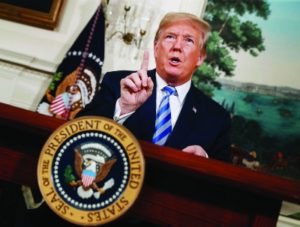
Pres. Donald Trump announces his decision to withdraw the US from the JCPOA. (Chip Somodevilla/Getty)
WASHINGTON — President Donald Trump said he would not waive sanctions on Iran by a deadline Saturday, May 12, effectively pulling out of the Iran deal.
“I am announcing today that the US will withdraw from the Iran nuclear deal,” Trump said, speaking at the White House on Tuesday, May 8. “In a few moments, I will sign a presidential memorandum to reinstate nuclear sanctions on the Iranian regime.”
The sanctions Trump will reinstate target countries, businesses and individuals that deal with Iran’s financial system.
Trump’s decision came after a full court press by three European nations also party to the 2015 deal not to pull out. They believe the nuclear deal could have been strenghened, and that a US pull-out will enable and encourage Iran to restart its nuclear program.
Over recent weeks, French President Emmanuel Macron, German Chancellor Angela Merkel and British Foreign Secretary Boris Johnson have visited Washington to try and persuade Trump to stay in the deal. Trump and Macron, who are close, spoke earlier Tuesday.
Israel and Saudi Arabia, by contrast, have been US allies pressing for a pullout from the deal.
Netanyahu last week unveiled documents showing that Iran had before the 2015 deal hidden the breadth of its nuclear weapons development.
The countries closest to Iran believe that Iran’s commitment to forswear nuclear development is likely dishonest, and in any event limited in time, and that it is best to confront Iran rather than let it proceed.
The deal swaps sanctions relief for Iran’s rollback of its nuclear program.
Trump had said he might stay in the deal if it could be renegotiated to remove “sunset” clauses that allow Iran to resume some enrichment of fissile material within a decade.
He also wants a tougher inspections regime and to roll a missile testing ban into the deal.
European allies said reopening the deal now, particularly in relation to the sunset clauses, was impossible, especially given the adamant opposition of the other parties: Iran, Russia and China.
Instead, they countenanced increasing pressure on Iran in other arenas, including new sanctions targeting its missile testing, and then committing to pressure on Iran as the sunset clauses loomed closer to extend bans on enrichment.
Trump rejected those overtures. “This was a one-sided deal that should have never ever been made,” he said.
Trump credited Netanyahu’s presentation in making his decision. “Today we have definitive proof that this promise was a lie,” he said, referring to Iran’s pledge to roll back its nuclear program.
“It is clear to me that we cannot prevent an Iranian nuclear bomb under the decaying and rotten structure of the current agreement,” he said. “The Iran deal is defective at its core.”
It’s not clear what happens going forward. The Trump administration would have to put in place staff and mechanisms to monitor compliance with US sanctions, a process that could take months, giving some leeway to renegotiate a deal.
On the other hand, simply announcing the reimposition of sanctions is likely to have an inhibitive effect on doing business with Iran, effectively crippling the deal almost immediately.
















